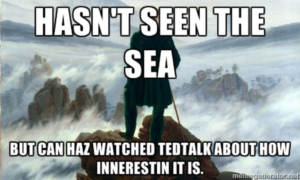A few months ago I read Flaubert’s Temptations of St. Anthony, translated by Lafcadio Hearn. At the time there was a niggling, nagging thing in my brain. I knew I had read some philosopher/intellectual discussing – pontificating about – the thought of Lafcadio Hearn. But where would I have been reading about that? ‘Lafcadio’ is, of course, an unusual name, mostly associated with lions that shoot back, so ‘Lafcadio Hearn’ is a name to conjure with. But conjure what, and when, where? But this week I solved the riddle. Here is my favorite passage from E.M. Forster, “The Machine Stops” (1909):
Advanced thinkers, like Vashti, had always held it foolish to visit the surface of the earth. Air-ships might be necessary, but what was the good of going out for mere curiosity and crawling along for a mile or two in a terrestrial motor? The habit was vulgar and perhaps faintly improper: it was unproductive of ideas, and had no connection with the habits that really mattered. So respirators were abolished, and with them, of course, the terrestrial motors, and except for a few lecturers, who complained that they were debarred access to their subject-matter, the development was accepted quietly. Those who still wanted to know what the earth was like had after all only to listen to some gramophone, or to look into some cinematophote. And even the lecturers acquiesced when they found that a lecture on the sea was none the less stimulating when compiled out of other lectures that had already been delivered on the same subject. “Beware of first-hand ideas!” exclaimed one of the most advanced of them. “First-hand ideas do not really exist. They are but the physical impressions produced by life and fear, and on this gross foundation who could erect a philosophy? Let your ideas be second-hand, and if possible tenth-hand, for then they will be far removed from that disturbing element — direct observation. Do not learn anything about this subject of mine — the French Revolution. Learn instead what I think that Enicharmon thought Urizen thought Gutch thought Ho-Yung thought Chi-Bo-Sing thought Lafcadio Hearn thought Carlyle thought Mirabeau said about the French Revolution. Through the medium of these ten great minds, the blood that was shed at Paris and the windows that were broken at Versailles will be clarified to an idea which you may employ most profitably in your daily lives. But be sure that the intermediates are many and varied, for in history one authority exists to counteract another. Urizen must counteract the scepticism of Ho-Yung and Enicharmon, I must myself counteract the impetuosity of Gutch. You who listen to me are in a better position to judge about the French Revolution than I am. Your descendants will be even in a better position than you, for they will learn what you think I think, and yet another intermediate will be added to the chain. And in time” — his voice rose — “there will come a generation that has got beyond facts, beyond impressions, a generation absolutely colourless, a generation seraphically free from taint of personality, which will see the French Revolution not as it happened, nor as they would like it to have happened, but as it would have happened, had it taken place in the days of the Machine.”
Obviously I’m rereading this because it’s Utopia/Dystopia week in my SF and Philosophy module, per my previous post. Forster kind of predicted the internet, and some of its pathologies. But he didn’t predict the popularity of cat memes. So last time I lectured about the story – not this time around – I summarized some of its main story elements and themes with help from memegenerator.
And the tragic ending.



{ 17 comments }
Gabriel 10.20.17 at 6:13 am
4chan for the philosophy and literature, CT for the memes.
Mike Schilling 10.20.17 at 7:18 am
John probably already knows this, but the Science Fiction & Fantasy Writers of America voted The Machine Stops one of the best SF novellas ever, along with the more expected Heinlein and Asimov. https://en.wikipedia.org/wiki/The_Science_Fiction_Hall_of_Fame,_Volume_Two
John Holbo 10.20.17 at 7:25 am
Yep, CT is all about the cat memes. I actually had 6 or 7 more for my lecture. But, like I said, I didn’t use them this time around. Can haz jokes are so 2013. I think my students are too young to get them.
John Holbo 10.20.17 at 8:10 am
I didn’t know about that particular award, Mike. I’m not too surprised. I do think it deserves to be better known, but it hasn’t exactly languished. I should probably work through those old hall-of-fame volumes. I don’t know all that stuff.
Gabriel 10.20.17 at 11:25 am
A few years back I told the director of one of the major SF writing workshops that E.M. Forster had written a science fiction novella; she had no idea. So it’s still something that’s a bit obscure, even in SFWA.
BrendanTHalpin 10.20.17 at 2:38 pm
You can follow him on Twitter: @LafcadioHearn1
Aardvark Cheeselog 10.20.17 at 3:18 pm
Hearn is an interesting character. I’d previously heard of him as one of the first English-language writers to have anything to say about Zen. I had no idea he wrote science fiction.
Whirrlaway 10.20.17 at 5:43 pm
The modern Church is so overrun with this sort of thing that most people don’t even believe there even was a “French Revolution”, so to speak. Pure suspension of disbelief.
peterv 10.20.17 at 8:55 pm
His house in Matsue is preserved as a fine museum.
John Holbo 10.21.17 at 1:17 am
“Hearn is an interesting character. I’d previously heard of him as one of the first English-language writers to have anything to say about Zen. I had no idea he wrote science fiction.”
No, he didn’t write science fiction. He was written about IN science fiction! (Unless he also wrote science fiction, which I wouldn’t put past him.)
Lee A. Arnold 10.21.17 at 9:15 am
The Forster excerpt is a great example of the emergence of an idea that percolated throughout the 19th Century and publicly crystallized around the time of WWI.
Perhaps it isn’t one idea so much as a clutch of ideas, or the single feeling of a despairing combination: the possibility of cultural divorce from reality (e.g. Forster), the sense that complications have wrought intellectual enervation (e.g. Valery, “Crisis of the Mind” 1919), the sense that technological innovation is running ahead of cultural reintegration, the sense that the language of commerce has atomized and degraded human thought (e.g. Joyce, Ulysses 1922). A general uncertainty suddenly framed the mundane fears of economics, politics and war.
Writers soon noted the overall idea of this emergence, describing it under terms such as “age of anxiety” and existentialism.
But would science provide a reasonable substitute in the future? The answer appeared to be no. The search for formal foundations of human thought that might be revealed in logic and mathematics foundered around the time of the next great war. Examples of this conclusion, emerging from very different avenues: Gödel 1931, Husserl’s Crisis of the European Sciences 1936, Wittgenstein 1953. There might be no formalizable basis for certainty.
The great mass of people didn’t mind, because the post-WWII world suddenly launched into a technological consumer-goods revolution. With tranquilizers. Science might not give an ultimate foundation, but it rearranged atoms just fine!
Maybe there really had been no crisis? Maybe it was an emotional holdover, a mourning after the death of God, crossing with the inability to predict future innovations?
Then what guides us? Really it is a default setting, constructed out of complications: the idea that the new combination of individualism, science, markets, redistribution & voting will steer us into a good future.
This has gone on for 70 years until now, during which time a tribal split has emerged over questions: about what the cultural standard is, about how to trust other people, about whether a person’s worth requires his/her success in self-support by the getting of money, etc.
Now an ultimate technology, computer machine learning, has come along to outdo and displace human intellectual thought in many of its economic applications, by acceleration of statistical computations — and it doesn’t matter whether or not this is how our meatbrains would arrive at the same outcomes.
It is a story starting around a hundred years ago about the cultural emergence of uncertainty. We don’t know what is happening around us, nor whether it is utopic or dystopic. We need a new Forster to write this story, up to date.
soru 10.21.17 at 11:41 am
Do ghost stories count as science fiction if the author believes in them?
steven t johnson 10.21.17 at 2:29 pm
soru@12 The old Psychical Research Society kind of spiritualism, with its talk of ectoplasm and vibrations and etheric planes, or J.B. Rhine’s ESP/parapsychology were pseudosciences that revived old religious ideas under a falsely secular guise. And many (I hope most people?) realize that UFOlogy is a congeries of UFO cults. Heaven’s Gate should come to mind.
The thing is, does the writer also “believe” that their fictional world also has mundane reality following the standard rules according to modern scientific understanding? So, yeah, a ghost story can be written as SF. In one sense this is a purely stylistic difference, the ghost story genre concerning someone being haunted (by shame, guilt, crime,) and the paraphernalia of the haunting is materially irrelevant. But then, style is very important, no?
Raven 10.23.17 at 1:34 am
Patrick “Lafcadio†Hearn a.k.a. Koizumi Yakumo was, inter alia, the first known foreigner to become a legally naturalized subject of Imperial Japan.
J-D 10.23.17 at 10:28 am
soru
No, stories count as fiction only if the author does not believe in them. If I recount an original story I believe to be true, the result might be a journal entry, a formal report, an official memorandum, a memoir, a piece of gossip, a documentary record, a manifestation of psychiatric illness, a letter, or many other things, but it’s not a fiction. If the contents are untrue, or partly untrue, then you might have an inaccurate documentary record, an inaccurate journal entry, an inaccurate piece of gossip, or the like, but still not a fiction.
If somebody else invents a story, knowing it to be untrue, and I recount it believing it to be true, the result might be, for example, a fraud, a practical joke, or an urban legend, but it counts as a fiction only as the original narrator didn’t believe it to be true.
Andrew Brown 10.24.17 at 9:30 am
What I love about this passage is that it is the justification of [citation needed] wikipedia’s policy against original research. And it leads to exactly the uniform anachronistic surface that Forster describes.
CivisPeregrinusFuturus 10.24.17 at 10:20 am
@Raven
I rather suspect that William Adams/Miura Anjin has a better claim to being the first foreigner to be naturalized in Imperial Japan.
Comments on this entry are closed.